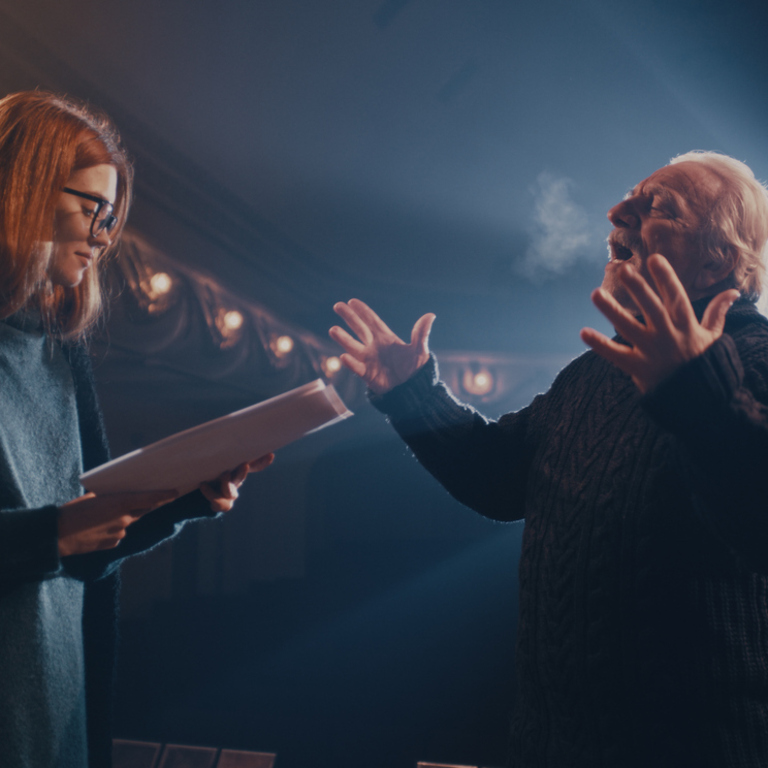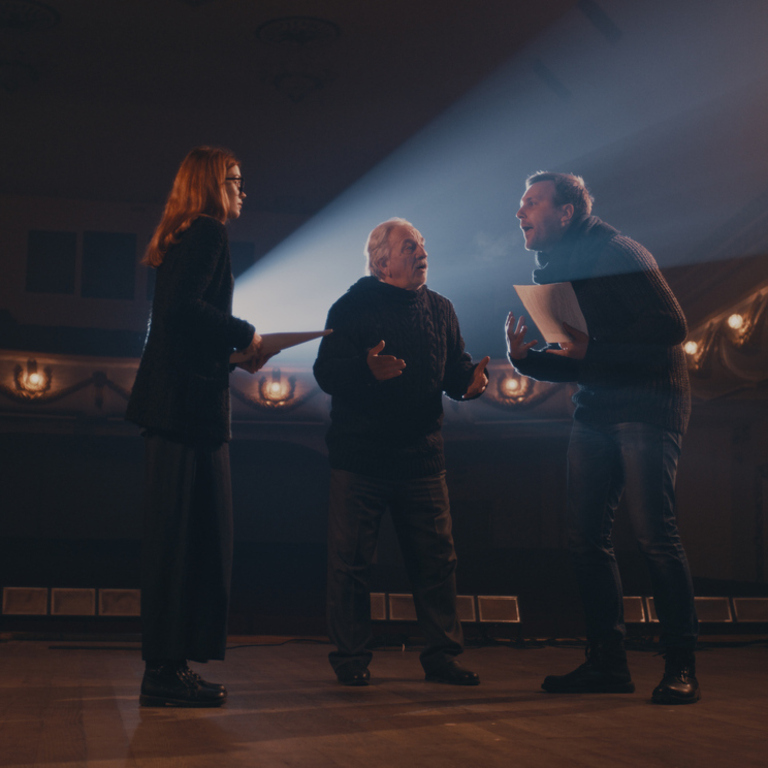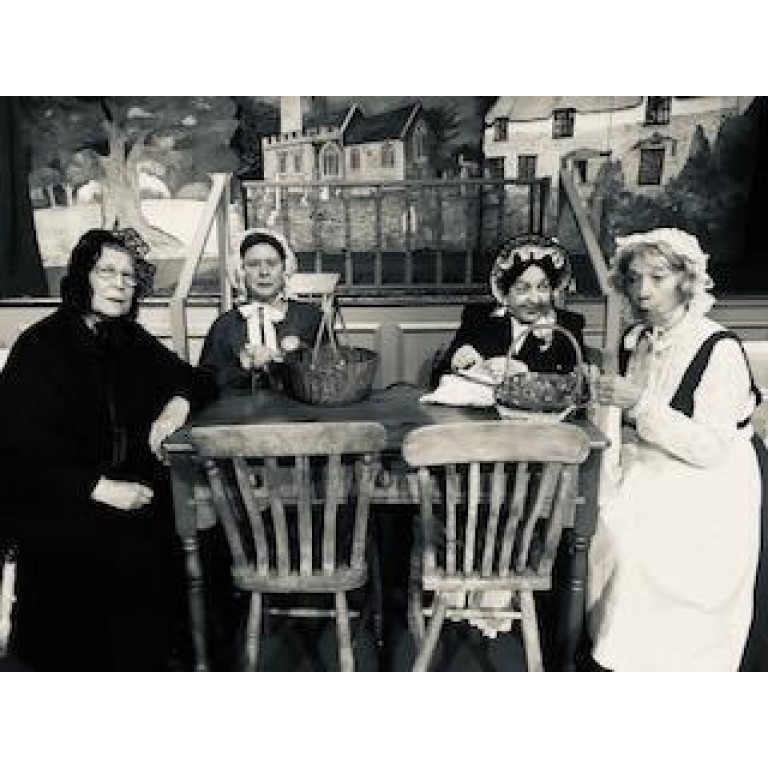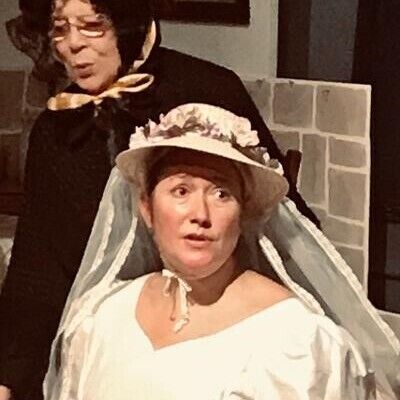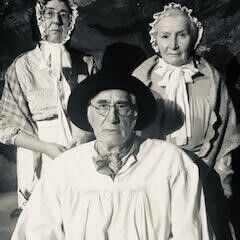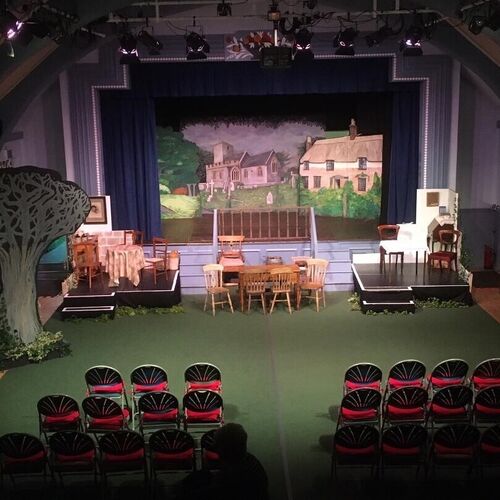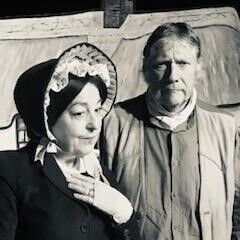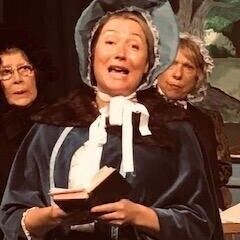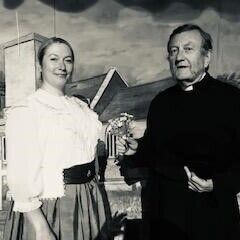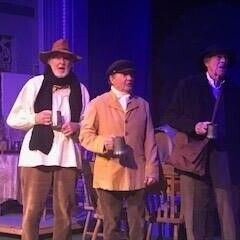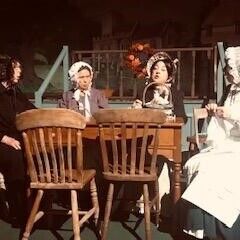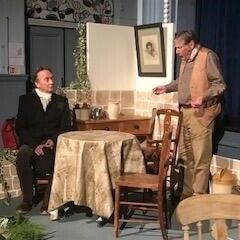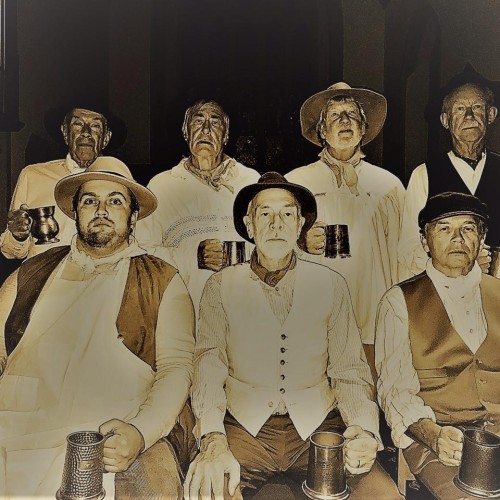
posted 2nd September 2024
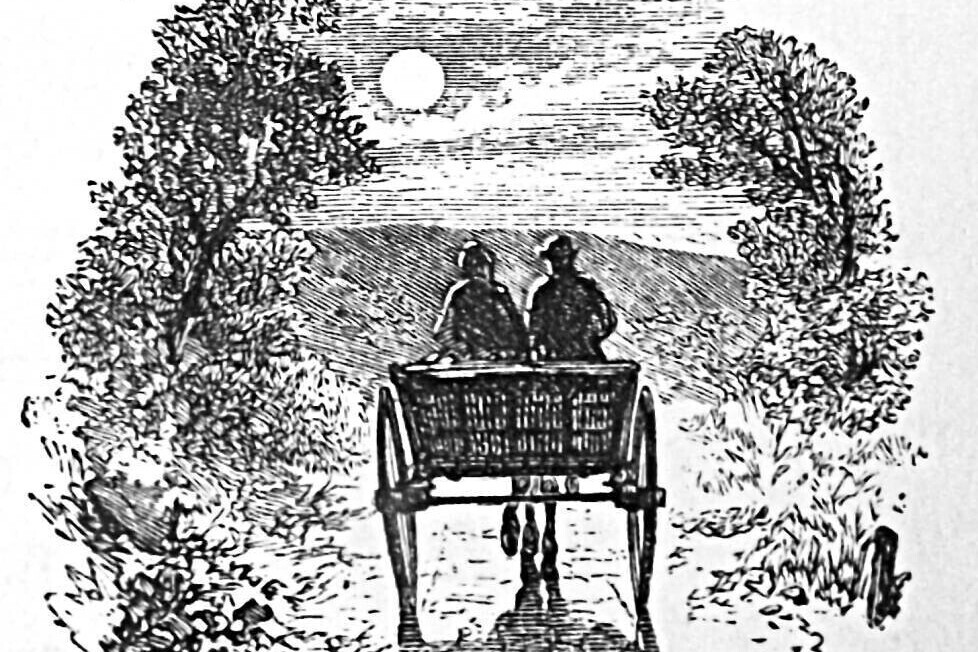
The Mellstock Quire is a play with music inspired by and adapted from Thomas Hardy’s novel Under the Greenwood Tree by Clare Philbrock, who is also directing. It is 1870. In the Wessex village of Mellstock, life has gone on much the same for generations. At the heart of the village is the Quire whose music and singing accompany the community through the year. The seasons come and go with their predictable rhythms, but change is afoot with the arrival of the new Parson, Reverend Maybold, whose plans to modernise worship at the Church do not include the Quire. And what about the new School Mistress Miss Fancy Day? She is refined, educated, and fair of face; surely, she must be in need of a husband, but will she marry to please her father, or to improve herself or for love?
Review
Review by Bill Pattinson
After two years it was wonderful to see live theatre in Matthews Hall, Topsham, once again, performed by the Estuary Players. This was a joyous ensemble production of “The Mellstock Quire”, which is the alternative title for Thomas Hardy’s book “Under the Greenwood Tree.” This is Hardy’s early and most optimistic, contented novel where there is no suffering because of love. This production, such an appropriate choice after the struggles of the pandemic, captured the timelessness and representation of rural idyll and pastoral innocence which Hardy portrays in his Wessex novel, set in the 1870s. It was clear that the Estuary Players had not been idle during those days of lockdown, social distancing and face coverings because, with a cast of twenty one, including some new faces, supported by thirteen backstage, the current strength of the society was there for everyone to see.
Special mention must be given to Clare Philbrock, a member of Estuary Players, who had given great thought to the writing of the play, a lockdown project of considerable challenge, then to directing the production, which included designing the marvellous set. The primary aim of Clare’s direction was to immerse the audience into the Victorian village of Mellstock, to make them indeed feel as though they were part of this very community. This was encapsulated by the singing, acting and dancing happening all around the hall, behind and to the side, as well as in the front. The opening scene, set in the season of winter, with the well dressed company singing the first of many renditions of “I like to rise” immediately transported you into Mellstock, 1870. It was an invitation to sit back and enjoy.
The story centres around the all male members of the Mellstock Quire, who were just as likely to sing their hymns around a barrel of cider as in the gallery of the church. The new parson, Reverend Maybold, wishes to replace the choir with the organ, especially as this is to be pedalled by the attractive, rather flighty young woman and recently appointed School Mistress, Miss Fancy Day. The sub plot is the stumbling love affair of the very same Miss Fancy and Dick Dewy, the son of the leader of the quire, Reuben. A whole year passes in the telling of the drama, the passing of time being reflected through the singing of seasonal hymns, the decking of the set with appropriate floral displays and the careful changing of the leaves and branches of a finely made Greenwood tree, which boldly stood down stage right of the set. I especially admired the set. The excellent art work at the back of the set portrayed the church, Hardy’s cottage and the Greenwood tree. The stage was reserved as the church gallery, while the Dewey’s home on the floor of the hall shouldered neighbours with Fred Shiner’s home, a hopeful for Miss Day’s hand, and Geoffrey Day’s home, Miss Fancy’s father, on its right and the home of Miss Day herself on the left. Enough room was left for the well choreographed folk dancing and eventual wedding celebrations to be fully enjoyed by the audience.
The members of the quire, ably led by Alan Caig as Reuben Dewy, brought humour and a good sense of camaraderie to the play. I especially liked the scene when Miss Fancy Day’s singing of the final verse of “While Shepherds watched” in the nave of the church, virtually silenced the quire in the gallery, thus foretelling the forthcoming replacement of the quire by the organ played by Miss Day, which was to happen at Michaelmas. Becky Davies as Fancy Day managed to balance the sometimes awkward embarrassment of her role with her enjoyment of the flirtatious situation of capturing three men who more than “fancied” her. Mike Killoran, as the well dressed wealthy farmer and churchwarden, Fred Shiner, strutted the stage with a confident presence absolutely convinced he would marry Fancy Day not because he loved her, but because he was in need of a wife. Ray Virr as Geoffrey Day, Fancy’s father, skilfully portrayed a member of the socially mobile rural class, firmly convinced that his daughter should marry into the wealth and position of Fred Shiner rather than Dick Dewy, a tranter, who was hardly better than a farm hand. Howard Eilbeck, as Reverend Maybold, remained suitably above and distanced from his rural parishioners, firmly convinced that he knew the best way forward for his Church.
Apart from Miss Fancy, the women’s roles in this play are acted around gossip and village amusement in the Dewy’s house, occasionally interrupted by church going or dancing on the village green. Characterising these small roles is never easy. One way of achieving this is to use humorous repetition. Anne Killoran brought her character of Mrs Bowman to life while repeating “Not my favourite time of year’ for each of the four seasons. This was quickly followed up with “See you in church” by the Misses Leaf. But the star of this form of characterisation was Keith Palmer, as the rather simple farmhand, Thomas Leaf, whose running joke was, “Wait for me, hee, hee.”
This was a warm, joyful production, which I am sure was great fun in which to be involved. I thoroughly enjoyed the evening. Congratulations to the whole company assembled. Here’s to “The Mellstock Quire”, my sonnies!
Cast and Crew
Company
Dick Dewy, a Tranter (Carrier)… Ian Potts
Michael Male, a Stonemason… Sam King
Elias Spinks, a Bookkeeper… Cass Thorne
Robert Penny, a Boot and Shoemaker… Bob Drury
Joseph Bowman, a Thatcher… Martin Paine
Thomas Leaf, a Farmhand… Keith Palmer
Reuben Dewy, A Tranter and Dick’s Father… Alan Caig
Ann Dewy, Dick’s Mother… Suzanne Dunstan
Susan Dewy, Dick’s Sister… Chris Eilbeck
Mother Dewy, Reuben’s Mother… Maggie Butt
Fancy Day, the new School Mistress… Becky Davies
Mr Fred Shiner, a Farmer… Mike Killoran
Reverend Maybold, the new Parson… Howard Eilbeck
Mrs Agnes Penny, Robert Penny’s Wife… Pat Peters
Geoffrey Day, Fancy Day’s Father… Ray Virr
Mrs Male, Michael Male’s Wife… Lynn Leger
Mrs Spinks, Elias Spinks’ Wife… Rose Gander
Mrs Bowman, Joseph Bowman’s Wife… Anne Killoran
The Misses Leaf, Thomas Leaf’s Sisters… Margaret Bond and Lynn Trout
Nan…Rosemary Whitehurst
Production Team
Writer and Director… Clare Philbrock
Folk Music Director… Min Wild
Church Music Director… Mark Perry
Folk Musicians… Min Wild, Adrian Wynn, John Bickford and Bob Powell
Stage Manager… Janine Warre, assisted by
Production Manager… Maggie Butt
Set Design…Clare Philbrock and Phil Keen
Set Painting and Construction… Phil Keen assisted by Maurice Webb, Marcus XXX and Tonia XXX
Lighting Design… Peter Tapp and Martin Paine
Sound Operator… John Bradley
Costume Coordinator… Janine Warre, assisted by Clare Philbrock, Margaret Bond and Pat Peters
Props and Furniture… Coordinator Janine Warre, assisted by Pat Peters
Poster Design… Clare Philbrock and Phil Keen
Programme… Clare Philbrock, Alan Caig and Phil Keen
Box Office…Howard Eilbeck and Chris Eilbeck
Front of House Manager… Rosie Munns and Team









